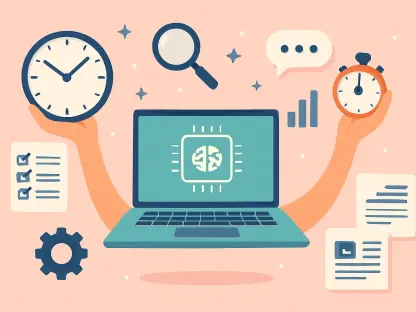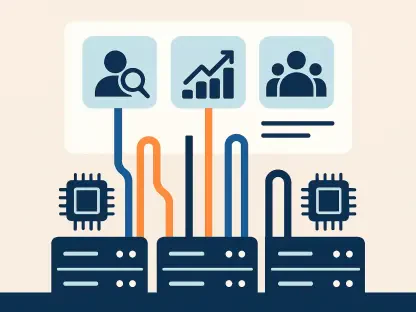In the past few years, artificial intelligence (AI) has become deeply rooted in the business landscape, sparking transformational changes and shifting how businesses operate. Organizations across various sectors are increasingly leveraging AI to streamline processes, enhance decision-making, and bolster their competitive edge. The integration of AI into business workflows not only optimizes operational efficiency but also unlocks new avenues for growth by seamlessly blending human capability with machine precision. Leaders are now navigating this digital frontier, aiming to achieve a harmonious balance between technological innovations and human expertise.
The Efficiency Enhancements of AI
Redefining Task Management
AI’s transformative impact on task management is a testament to its prowess in enhancing business efficiency. The advent of AI has allowed organizations to automate mundane and repetitive processes that previously consumed a significant portion of employees’ time. Tasks such as data entry, customer support, and inventory management are now expedited with AI-driven tools, enabling businesses to reallocate human resources toward more strategic initiatives. This shift not only reduces operational bottlenecks but also fosters an environment where employees can focus on tasks that require critical thinking and creativity.
Furthermore, AI enhances task management through predictive analytics, identifying patterns and trends that inform decision-making and forecasting. By anticipating customer demands or potential system failures, companies can proactively address challenges, minimizing disruptions. This foresight, powered by AI, enables organizations to maintain continuity and stay ahead of market demands, thereby embedding resilience into their operational fabric. As a result, businesses experience a tangible increase in productivity, which in turn fuels growth and profitability.
Elevating Workforce Efficiency
AI’s influence on elevating workforce efficiency cannot be understated. By automating routine tasks, AI liberates employees from manual labor, allowing them to harness their unique skills in areas where human judgment is crucial. This symbiotic relationship between AI and the workforce is fundamental to achieving a balance where technology complements human effort. Moreover, AI-driven tools often provide real-time insights and feedback that empower employees to make informed decisions swiftly, leading to agile and responsive business operations. By augmenting the workforce with AI, companies foster a culture of continuous improvement and adaptability essential for sustained growth.
Additionally, AI facilitates personalized learning and development, ensuring that employees are upskilled and prepared for evolving job roles. Through AI-driven analyses, companies identify skill gaps and tailor training programs to address them effectively. This investment in human capital not only strengthens the workforce but also reinforces a company’s commitment to nurturing talent. Ultimately, the integration of AI into the workforce trajectory enables organizations to stay competitive and agile in an increasingly digital economy.
AI as a Catalyst for Business Growth
Unleashing Innovation
AI serves as a powerful catalyst for innovation, driving businesses to explore untapped opportunities and redefine their market presence. By providing unprecedented access to vast amounts of data, AI empowers businesses to unearth actionable insights that were previously unattainable. These insights fuel the innovation pipeline, enabling the creation of new products, services, and business models that cater to emerging consumer needs. Consequently, organizations can explore new market segments, expand their offerings, and navigate industry landscapes with creativity and foresight.
Moreover, AI’s ability to simulate scenarios and predict outcomes aids in strategic planning and risk management, streamlining decision-making processes. Businesses can evaluate potential ventures or investments more effectively, minimizing risk while maximizing returns. By aligning innovation with data-driven strategies, organizations can accelerate growth, achieve market differentiation, and consistently deliver value to their stakeholders. This dynamic landscape of innovation, supported by AI, ensures that businesses are not just responding to change but actively shaping it.
Enhancing Customer Experience
Elevating the customer experience stands as one of AI’s most significant contributions to business growth. AI-driven customer insights enable companies to understand and anticipate consumer preferences, allowing for hyper-personalized interactions and offerings. From recommendation engines in e-commerce to AI-powered chatbots that provide 24/7 support, businesses are able to elevate their customer service capabilities significantly. By delivering tailored experiences, companies foster customer loyalty and retention, translating into long-term growth.
Furthermore, AI enhances the customer journey by optimizing supply chain logistics, ensuring that products and services are delivered efficiently and accurately. Through AI-driven analytics, businesses can fine-tune their supply chains, reducing delays and enhancing the overall customer experience. This seamless integration of AI into customer-facing operations ensures that businesses deliver not only products but comprehensive experiences that resonate with consumers. As a result, companies can achieve competitive advantages and capitalize on the evolving consumer landscape.
Concluding Thoughts: Empowering the Future
In recent years, artificial intelligence (AI) has become a central figure in the business world, ushering in major changes and altering traditional operational methods. Companies across diverse industries are increasingly adopting AI to streamline various business procedures, improve decision-making capabilities, and heighten their competitive advantage. This infusion of AI into business processes not only enhances efficiency but also opens up fresh opportunities for growth by creatively integrating human talents with the precise capabilities offered by machines. Business leaders today face the exciting yet challenging task of navigating this digital era, striving to find the optimal balance between cutting-edge technological innovations and the invaluable insights provided by human expertise. As AI continues to evolve, its potential to reshape industries and redefine strategies becomes evident, promising a future where technology and human ingenuity work in tandem to drive success and innovation.









